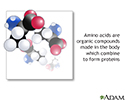Tryptophan
Tryptophan is an amino acid needed for normal growth in infants and for the production and maintenance of the body's proteins, muscles, enzymes, and neurotransmitters. It is an essential amino acid. This means your body cannot produce it, so you must get it from your diet.
The body uses tryptophan to help make melatonin and serotonin. Melatonin helps regulate the sleep-wake cycle, and serotonin is thought to help regulate appetite, sleep, mood, and pain.
The liver can also use tryptophan to produce niacin (vitamin B3), which is needed for energy metabolism and DNA production. In order for tryptophan in the diet to be changed into niacin, the body needs to have enough:
- Iron
- Riboflavin
- Vitamin B6
Food Sources
Tryptophan can be found in:
- Cheese
- Chicken
- Egg whites
- Fish
- Milk
- Sunflower seeds
- Peanuts
- Pumpkin seeds
- Sesame seeds
- Soy beans
- Turkey
References
Nagai R, Taniguchi N. Amino acids and proteins. In: Baynes JW, Dominiczak MH, eds. Medical Biochemistry. 5th ed. Philadelphia, PA: Elsevier; 2019:chap 2.
United States Department of Health and Human Services; United States Department of Agriculture. 2015-2020 Dietary Guidelines for Americans. 8th ed. health.gov/our-work/food-nutrition/2015-2020-dietary-guidelines/guidelines/. Updated December 2015. Accessed May 27, 2022.
Review Date: 2/4/2022
Reviewed By: Meagan Bridges, RD, University of Virginia Health System, Charlottesville, VA. Also reviewed by David Zieve, MD, MHA, Medical Director, Brenda Conaway, Editorial Director, and the A.D.A.M. Editorial team.




